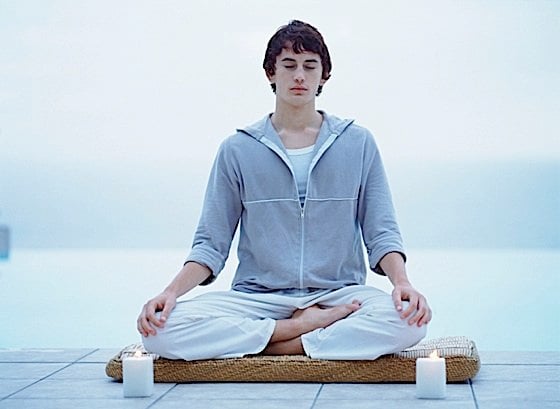Making Healthy Choices in Addiction Recovery: the importance of mindfulness, rest, nutrition and exercise; part 4 in a series
Adam Cook returns with Part 3 in his series on addiction and recovery.
- Part 1, “Reclaim your mental well-being” from addiction is here>>
- Part 2, “Thriving post-rehab: achieving long-lasting addiction recovery” is here>>
- Part 3, “Finding your niche: advice for those in recovery who seek employment, is here>>
By Adam Cook
Addiction recovery isn’t just about quitting substance abuse. If you’re going to stay sober and build a new, better life for yourself, it’s important to make positive choices in all aspects of your life. One way to do that is by adopting healthy daily habits to give you the physical, mental and emotional strength you need now and moving forward.

Mindfulness
A strong mind is just as important as a strong body. For the fortitude to push through anxiety, self-doubt and other forms of mental distress, incorporate mindfulness practices into your recovery plan.
Mindful.org defines mindfulness as “the basic human ability to be fully present, aware of where we are and what we’re doing, and not overly reactive or overwhelmed by what’s going on around us.” While everyone is born with the ability to be mindful, it’s a skill that’s commonly lost when a person starts using drugs or alcohol to avoid problems.
You can cultivate the skill of mindfulness through a variety of techniques. Experiment with different types of meditation, yoga, breathing exercises and other mindfulness practices to find the strategies that help you move past self-destructive thoughts and toward peace of mind.
Like recovering from addiction, building healthy habits is about making good choices and taking it one day at a time. You may experience setbacks or fail to live up to your own standards once in a while, but it’s not the end of the world. The important thing is staying committed to moving forward, and always getting back on track when life leads you astray. After all, you’re worth staying sober for.
Rest

Unfortunately, getting adequate rest is a common problem for many Americans, but those overcoming addiction can be especially prone to sleep disorders. Sleep is truly the foundation for a healthy life, so it’s important to re-establish healthy sleep habits in sobriety. VeryWellMind suggests creating a soothing bedtime ritual and resetting your circadian rhythm, both of which can be accomplished by ensuring your bedroom fosters deep, restful sleep. If you need to block out light, add blackout curtains to your windows, and if excess noise is an issue, pop in some earplugs, or turn on a fan or white noise machine. You should also take a look at your mattress, especially if you wake up feeling groggy or achey. A mattress that’s at least seven years old is probably past its prime and could be responsible for your bedtime woes, so if that’s the case, invest in the quality sleep you deserve by getting an upgraded model.
Nutrition
Nutrition is an important part of healing your body from the effects of substance abuse. When you’re using drugs and alcohol, financing your addiction often takes precedence over eating healthy meals. You may have experienced significant weight loss or weight gain, and damaged your health through poor nutrition. Recovery is an opportunity to begin healing from that damage by addressing nutritional deficiencies and returning to a healthy weight. You can learn more about the nutritional impact of substance abuse at Today’s Dietitian.
Nutrition in recovery isn’t only about physical health. Fueling your body with healthy foods is also a powerful way to practice self-care. Every time you take a bite of wholesome foods, you’re making a choice to pursue a healthier, stronger you. In that way, good nutrition serves as a powerful reinforcement of your greater recovery goals.
Exercise

Overcoming addiction is stressful. It can leave you mentally drained and even depressed. Unfortunately, a weakened mind is one that’s primed for relapse. It’s critical to have a positive outlet for stress relief during addiction recovery. For many, that outlet is exercise.
According to Psych Central, exercise reduces stress and helps you manage depressive symptoms. It takes your mind off negative thoughts, improves your mood, and gives you energy, thereby increasing your ability to resist cravings. Physical activity also helps combat sleep disturbances, a common problem during recovery that the New York State Office of Alcoholism and Substance Abuse Services identifies as a threat to sustained sobriety.
You don’t need to be in shape to benefit from exercise. Anyone can incorporate exercise into recovery, whether that’s training for a fitness competition or just going on daily walks around the neighborhood. No matter your fitness level, you’ll reap benefits from getting active. However, it is possible to take exercise too far. Be aware of the signs of exercise addiction so you don’t inadvertently transfer your addictive behaviors to a new habit.
Editor’s Note
Buddhists emphasize meditation and mind in many practices, in part, to help us overcome attachments. Whether it’s addiction, or repetitive behaviours and attachments, destructive cravings are a major issue in today’s stress-filled world. Addiction-recovery is a difficult time. Special contributor Adam Cook, who runs AddictionHub.org gives tips and advice on positive changes that can be made to re-enforce. Although not specifically a Buddhist topic, we thought it was an important series — especially with his focus on helpful suggestions for those coping with recovery from addiction. DISCLAIMER: Please always seek the advice of professionals.
Feature image: Unsplash
More articles by this author
Search
Latest Features
Please support the "Spread the Dharma" mission as one of our heroic Dharma Supporting Members, or with a one-time donation.
Please Help Support the “Spread the Dharma” Mission!

Be a part of the noble mission as a supporting member or a patron, or a volunteer contributor of content.
The power of Dharma to help sentient beings, in part, lies in ensuring access to Buddha’s precious Dharma — the mission of Buddha Weekly. We can’t do it without you!
A non-profit association since 2007, Buddha Weekly published many feature articles, videos, and, podcasts. Please consider supporting the mission to preserve and “Spread the Dharma." Your support as either a patron or a supporting member helps defray the high costs of producing quality Dharma content. Thank you! Learn more here, or become one of our super karma heroes on Patreon.
Adam Cook
Author | Buddha Weekly
Special contributor Adam Cook, who runs AddictionHub.org became involved in helping people with addiction after an experience with a loved one. Although not specifically a Buddhist topic, we thought it was an important feature — especially with his focus on helpful suggestions for those coping with addiction. Some of his suggestions work equally well with people struggling with excessive cravings.
















